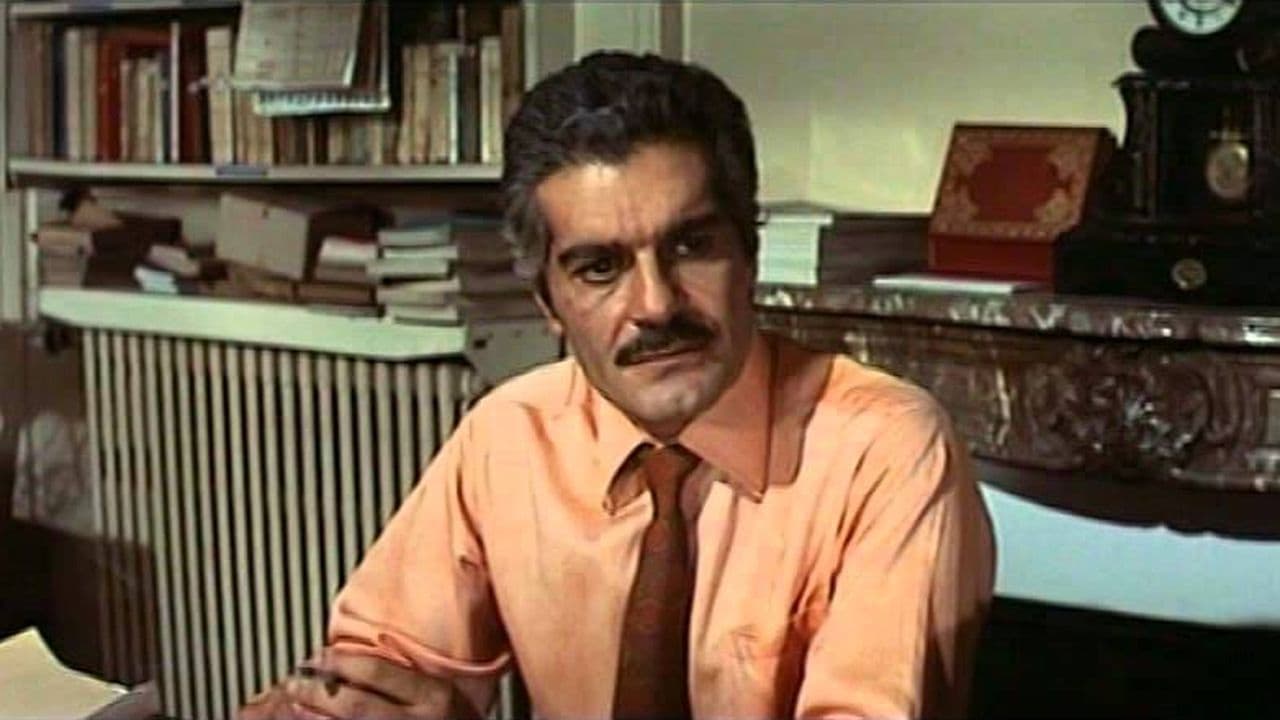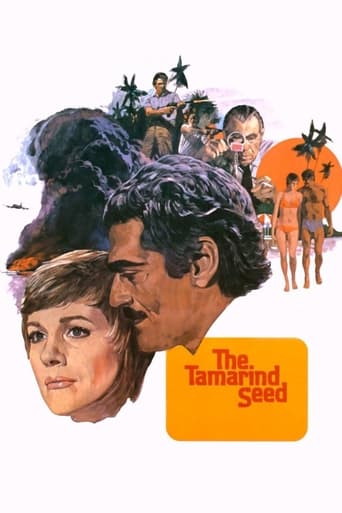

Blake Edwards made many entertaining films; some, like "Breakfast at Tiffany's" and "Victor Victoria," retain their class and glamour, while others, like "The Tamarind Seed," aimed for those same qualities, but fell short. Opening titles by Maurice Binder and a score by John Barry evoke the feel of a James Bond film and underscore the espionage elements. Unfortunately, the film, which was also scripted by Edwards from a novel by Evelyn Anthony, is saddled with an insipid love story that overwhelms the action and sinks the plot, and the Cold War intrigue is too little and too late to save the movie. While Julie Andrews and Omar Sharif have star power, the pair do not have much chemistry. The prim and proper Andrews is too cool for the smoldering Sharif, who should have been better teamed with an Ava Gardner.Andrews plays Judith Farrow, an English widow, who works at the British Home Office and has access to sensitive information. After a failed love affair, she travels to Barbados to recover. Sharif is Feodor Sverdlov, a military attache to the Russian Embassy in London, who also goes to Barbados; but is he on holiday or out to recruit Andrews? His motives are ambiguous, and his unconvincing attraction to the chilly Andrews skews viewers to believe the worst. While Sharif pursues Andrews, back in London, Anthony Quayle and Dan O'Herlihy monitor the situation in Barbados for Her Majesty's Goverrnment, while the pursuit of a Russian mole in British intelligence simmers. O'Herlihy is a man of secrets, and Sylvia Syms as his ambitious wife snipes at her husband's gay orientation, while she pursues an affair with a young employee of Quayle. During their romantic trysts, Syms's paramour leaks confidential information to her during the pillow talk. Got all that? The supporting players, who also include Oscar Homolka as a Russian general, are professional, if unexceptional, although Syms is a cut above the others.Similar comments could be made about the film, professional, if unexceptional. "The Tamarind Seed" is certainly well made, but predictable. Sharif and Andrews go through the motions, know their lines, and hit their marks, but nothing ignites between them. The plot is similarly mundane. Although a James-Bond like song is heard, Andrews never has an opportunity to sing, which may disappoint her fans. The glossy film resembles other Blake Edwards films in its polish, but not in its entertainment value. Perhaps "The Tamarind Seed" is not the worst way to pass two hours, but all involved have done much better work.
... View More"The Tamarind Seed" is a seventies spy thriller, but not a spy thriller in the action-adventure James Bond mould. This one has more in common with the Cold War dramas of John Le Carré, although a more exact comparison would be with a Le Carré novel crossed with the cheesy romantic fiction of the Mills and Boon School. At its heart is a romance between a British Home Office official and a Russian spy. The Briton is Judith Farrow, an attractive thirty-something widow. The Russian is Fyodor Sverdlov, a military attaché (diplomatic language for spy) at the Soviet embassy in Paris. The two meet while on holiday in Barbados. (The film's somewhat enigmatic title derives from a Barbadian legend about a tamarind tree which has borne seeds in the shape of a human head ever since a slave was hanged from it for a crime he did not commit).The audience are supposed to take the Judith/Sverdlov romance as genuine, although both the British and Soviet security services are suspicious of it. British intelligence suspect that Sverdlov is planning to recruit Judith (who has access to confidential Home Office information) as an agent. Their suspicions are compounded by the fact that, between the death of her husband in a car crash and beginning the romance with Sverdlov, Judith managed to fit in a failed love affair with Richard Paterson, Sverdlov's opposite number at the British embassy. Sverdlov tells his superiors in Soviet intelligence that he is indeed trying to recruit Judith, but they (with justification) suspect him of plotting to defect.When the film first appeared in 1974 much was made of the fact, or supposed fact, that Julie Andrews was getting away from the "goodie-two-shoes" image she had been lumbered with ever since "Mary Poppins" and "The Sound of Music"; I recall one reviewer expressing surprise because she briefly appears in a bikini. (Memo to reviewer: Julie is not a nun in real life). In fact, "The Tamarind Seed" marks much less of a break from this image than some of her later films such as "S.O.B." , also directed by her husband Blake Edwards. Judith may have affairs, but she is still the innocent heroine, even if the word "innocent" needs to be understood here in the sense of "naïve" rather than in that of "sexless". I was surprised by just how ready Judith is to take Sverdlov at face value, given that in the seventies any Briton working in a politically sensitive position would have been alert to the fact that the Soviet Union frequently used diplomacy as a cover for espionage (as, indeed, did many other countries).Sverdlov is played by the Egyptian actor Omar Sharif, a man who, at least in his English-language films, seemed to specialise in playing characters of every nationality but his own; he had previously played a Russian in "Dr Zhivago". As played by Sharif, Sverdlov does not really seem like a man in the throes of romantic passion; he comes across far more as the smooth, slick seducer which British intelligence believe him to be, making it all the more surprising that Judith was not more on her guard.Andrews is better than Sharif, although this is not one of her greatest performances, but the best acting comes from Anthony Quayle, who plays intelligence officer Jack Loder, head of security at the British embassy in Paris. Loder is the man handling Sverdlov's defection, but he does not entirely trust him, and not only for the obvious reason that Sverdlov may turn out to be a double agent. Loder is a patriot who sees intelligence work in terms of national interest rather than left-versus-right politics, and cannot understand a Russian who wants to betray Russia any more than he can understand a Briton who wants to betray Britain. Despite the nature of his work, Loder eventually turns out to have a humane and decent side to his character. Unlike most of his upper-class colleagues at the Embassy, he is from a working-class background, indicated by a strong regional accent.There is another decent performance from Dan O'Herlihy as Fergus Stephenson, a British diplomat who turns out to be a Soviet agent; he is portrayed as a member of the notorious Cambridge spy ring. (In 1974 only three of its five members had been identified, and there was much speculation about the identity of the others, later named as Anthony Blunt and John Cairncross). One thing I found difficult to understand, however, is the failure of Stephenson's wife, who loathes and despises him, to expose him when she discovers his treachery; the explanation given, that she is looking forward to the glamour of life as an Ambassador's wife when he is promoted, never rings true.The Cold War atmosphere of the seventies can seem very remote from the very different world of today, notwithstanding a renewal of anti-Russian feeling in certain quarters, and films about Cold War spy intrigue, including this one, can look very dated. This film, in fact, actually looks more dated than something like the Le Carré adaptation "The Spy Who Came in from the Cold", although that film was made in black-and-white nine years earlier, or even Carol Reed's "The Man Between" from the fifties. Those two films, however, are only incidentally about espionage; they are primarily about human nature and human relationships, and contain some great acting from their stars Richard Burton and James Mason. "The Tamarind Seed", by contrast, only arouses interest when it is about espionage and not about the glossy romance at its centre. 5/10
... View MoreBlake Edwards, better known for his comedies, directs this respectable spy film based on Evelyn Anthony's novel of the same title. July Andrews in on a holiday in Barbados trying to recover from a love affair with a married man. She meets Omar Sharif and she falls in love with him, only to discover that he's an international Russian spy willing to change sides.On the bright side, the story keeps you interested despite the slow pace. It shows that it is possible to make a nice spy film without crazy special effects, nonsense action scenes and going ballistic for the most unsuspected reason. There's a very nice soundtrack by John Barry and a spectacular song sung by Wilma Reading.On the dark side, it has several of the stereotypes of this kind of movies from the 70's, as for example, the Russians spies have a very strong Russian accent: how do they manage to spy and mingle without being noticed? To keep it short, a nice spy movie where for over 108 minutes, not a single gun is shot and not a single blood drop is spilt. It has great climax scene, where suspense is very well built. A rara avis nowadays, where the explosions have to be loud and action has to be unbelievable in the less realistic possible way. By the way, the movie is 119 minutes long and, believe it or not, July Andrews doesn't sing on this film!!
... View MoreOmar Sharif is the best part of this movie, he has the most charming and interesting lines, he is great as Fyodor. If you ever get lost during the film, his character will put you at ease. The film reminded me of Rosebud, a film Peter O'Toole did about embassies, spies, and strange liaisons.If you're wondering about the title, the tamarind seed is of importance to the Julie Andrew character when she and Omar are vacationing on the same island. The seed is very rare and it is a symbol of possibilities in my opinion. There's a lot of talk about ideologies, political games, conscience, and which side you're on. It's worth watching this movie to learn some interesting things, most of the intrigue and pleasure comes from Omar's performance.
... View More